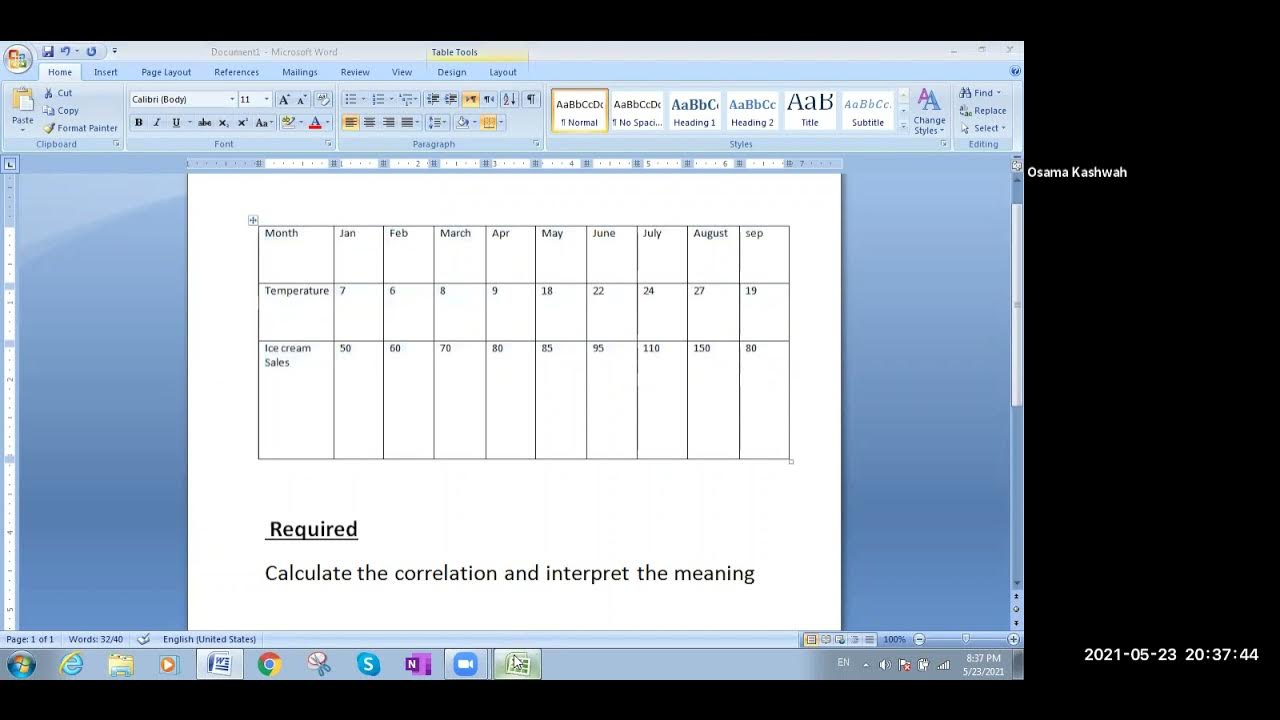How Ice Cream Kills! Correlation vs. Causation
Summary
TLDRThis script delves into the importance of distinguishing between correlation and causation, using the example of ice cream consumption and its supposed links to obesity, crime, and drowning deaths. It explains how correlation merely indicates a relationship without proving causation, often due to a third factor like weather. The script warns against the pitfalls of data dredging and emphasizes the rigorous process required to establish causation, as seen in pharmaceutical testing. It concludes by advising skepticism towards claims of causation and the complexity involved in proving such links.
Takeaways
- 🍨 The script discusses the dangers mistakenly attributed to ice cream consumption, such as obesity, crime rates, drowning deaths, and forest fires.
- 🔍 It highlights the importance of understanding the difference between correlation and causation when analyzing data.
- 🌡️ The script mentions that ice cream sales correlate with various issues due to a third factor: hot weather, which influences multiple behaviors.
- 📊 It warns against the pitfalls of data dredging, where relationships are found without a clear understanding of causation.
- ❌ The speaker refutes the idea that ice cream directly causes obesity, explaining that weight gain patterns do not support this claim.
- 🧠 Recent research suggests that the brain's hypothalamus might play a role in regulating appetite differently for fructose vs. glucose, which could influence overeating.
- 🍎 The script points out the complexity of causation by comparing the presence of fructose in both ice cream and natural fruits like apples.
- 💊 It uses the pharmaceutical industry as an example of the rigorous process required to prove causation, such as a drug's effect on health.
- 📉 The speaker notes the inverse relationship between ice cream sales and weight gain, challenging the common assumption of causation.
- 🏥 The FDA's strict standards for proving drug efficacy illustrate the high bar for establishing causation in scientific and medical contexts.
Q & A
What is the main issue discussed in the script regarding ice cream?
-The script discusses the misunderstanding of correlation and causation in relation to ice cream consumption and its supposed links to obesity, crime rates, drowning deaths, and forest fires.
Why is it incorrect to assume that ice cream directly causes obesity?
-It is incorrect because the relationship between ice cream consumption and obesity is a correlation, not causation. The script suggests that people tend to gain weight in winter when ice cream sales are low and lose weight in summer when ice cream consumption is high, indicating that other factors are likely at play.
What is the difference between correlation and causation as explained in the script?
-Correlation is when two things are related but one does not cause the other, often due to a third factor. Causation, on the other hand, is when there is a demonstrable cause-and-effect relationship where one thing directly causes another.
How does the script illustrate the concept of data dredging?
-The script uses data dredging to describe the practice of sifting through large amounts of data to find relationships, which can lead to identifying correlations that may not have a causal link, thus potentially misleading the interpretation of data.
What is an example of a coincidental correlation mentioned in the script?
-The script mentions the strong relationship between the sale of margarine and divorce rates in Maine as an example of a coincidental correlation, implying that there is no causal relationship between the two.
Why does the script mention the pharmaceutical industry in the context of causation?
-The script refers to the pharmaceutical industry to demonstrate the rigorous process required to prove causation, such as a drug's effect on lowering cholesterol or hair growth, which involves multiple phases of testing and clinical trials.
What is the significance of the 95% and 99% effectiveness rates mentioned in the script?
-These rates represent the acceptable error margins in clinical trials for drugs. A 95% effectiveness rate means there is a 95% chance the drug works as claimed, while a 99% rate is required for drugs with serious health implications, indicating a higher standard of proof.
How does the script challenge the idea that ice cream consumption leads to an increase in crime rates?
-The script suggests that the increase in crime rates might be related to more people being outdoors due to good weather, which is also when ice cream sales are high, rather than ice cream consumption directly causing an increase in crime.
What is the role of the hypothalamus in the context of the script's discussion on ice cream and appetite?
-The script discusses how the hypothalamus, a part of the brain that regulates appetite, reacts differently to fructose found in ice cream compared to glucose, potentially leading to a feeling of not being full and overeating.
Why does the script caution against drawing conclusions of causation from correlation?
-The script cautions against this because correlation does not imply causation, and drawing such conclusions can lead to misunderstandings and incorrect solutions to problems, as seen in the example of the supposed links between ice cream and various societal issues.
Outlines

Cette section est réservée aux utilisateurs payants. Améliorez votre compte pour accéder à cette section.
Améliorer maintenantMindmap

Cette section est réservée aux utilisateurs payants. Améliorez votre compte pour accéder à cette section.
Améliorer maintenantKeywords

Cette section est réservée aux utilisateurs payants. Améliorez votre compte pour accéder à cette section.
Améliorer maintenantHighlights

Cette section est réservée aux utilisateurs payants. Améliorez votre compte pour accéder à cette section.
Améliorer maintenantTranscripts

Cette section est réservée aux utilisateurs payants. Améliorez votre compte pour accéder à cette section.
Améliorer maintenant5.0 / 5 (0 votes)






